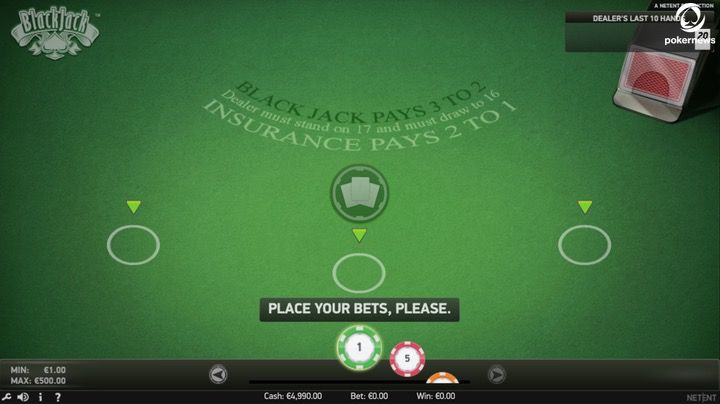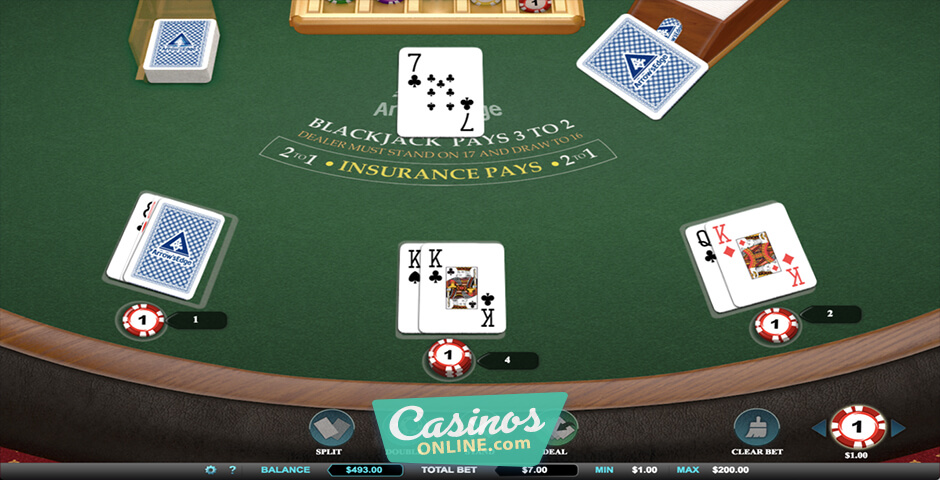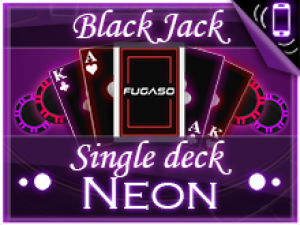A common rule difference in today's single deck blackjack games over the old days is that they pay six for five instead of three to two for blackjacks. Many players don't think this is such a bad thing, but we are going to try to change your mind.
The rule used to be it was always to your advantage to play on a game with the fewest decks. Compared to the math of a single deck game, that of a multi-deck game seriously handicaps your play:
- 0.35% for two decks
- 0.48% for four
- 0.54% for six
- 0.58% for eight
To see how this would affect you, if you were to play 100 hands per hour at $10 per hand, each
-0.1% of additional handicap would cost you approximately $1 per hour. Playing on a game with two decks versus one deck will cost you an extra $3.50 per hour, with each additional deck forcing you to cough up more and more of your bankroll.
Unsurprisingly, casinos started doing away with single decks so they could raise the edge, and now finding a single deck blackjack game today is a rare occurrence. There are however, casinos that are advertising, 'Back by popular demand, Single Deck Blackjack.' Be careful though because if you look closely at the table layout, you might see there's a heartbreaking message: 'Blackjack Pays 6:5.'

- Just wondering if a very large spread on a single deck 6-5 would overcome the house advantage? I've heard it takes a 20-1 spread, but I've also read that once the count got to plus 2 and over that an 8-1 spread can overcome the 6-5 payout and make the game beatable. I refuse to call that blackjack. The 6/5 payout adds 1.4% to the house edge.
- Divide running count by estimated number of unseen decks to get true count used in the strategy adjustment table. Note that for single deck, this division becomes a multiplication. For example, if there is 1/4 deck remaining and the running count is +2, then the true count is +8.
- Then, you can win in one of two ways: Either the dealer busts by going over 21, or you beat the dealer's hand. You can also push and will get your bet back if you tie the dealer. At the start of a game, you and the other players at the table place a bet. Then, you, the other players at the table and the dealer each receive two cards to start. You and the other players act on your hands before the dealer and can take one of several actions depending on the cards you are dealt.
As a general rule strategy changes are more valuable (important) in single deck games compared to multiple deck games. It's possible, in fact, to get the edge in single Blackjack games by just flat betting and varying your basic strategy based upon the count (although I recommend you also vary your bets in single deck games as well).
On a typical blackjack game, a blackjack typically pays 3:2. If you bet $20 and get a natural, you'll be paid $30. However, at these new 6:5 games, a $20 blackjack gets you only $24. Despite the fact that the game is played with a single deck, this one little rule change will dramatically lower your edge against the casino.


- Just wondering if a very large spread on a single deck 6-5 would overcome the house advantage? I've heard it takes a 20-1 spread, but I've also read that once the count got to plus 2 and over that an 8-1 spread can overcome the 6-5 payout and make the game beatable. I refuse to call that blackjack. The 6/5 payout adds 1.4% to the house edge.
- Divide running count by estimated number of unseen decks to get true count used in the strategy adjustment table. Note that for single deck, this division becomes a multiplication. For example, if there is 1/4 deck remaining and the running count is +2, then the true count is +8.
- Then, you can win in one of two ways: Either the dealer busts by going over 21, or you beat the dealer's hand. You can also push and will get your bet back if you tie the dealer. At the start of a game, you and the other players at the table place a bet. Then, you, the other players at the table and the dealer each receive two cards to start. You and the other players act on your hands before the dealer and can take one of several actions depending on the cards you are dealt.
As a general rule strategy changes are more valuable (important) in single deck games compared to multiple deck games. It's possible, in fact, to get the edge in single Blackjack games by just flat betting and varying your basic strategy based upon the count (although I recommend you also vary your bets in single deck games as well).
On a typical blackjack game, a blackjack typically pays 3:2. If you bet $20 and get a natural, you'll be paid $30. However, at these new 6:5 games, a $20 blackjack gets you only $24. Despite the fact that the game is played with a single deck, this one little rule change will dramatically lower your edge against the casino.
This new single deck game has been very successful for the casinos because the uninformed player has been told over the years that single deck blackjack is a better game than the shoe games that are now
scene on most of the casino floors. But the truth is that by accepting blackjack payouts reduced from 3:2 to 6:5 you are giving the casino a 1.39% advantage. Compare that to an 8-deck game where the house edge for a basic strategy player is a more civilized 0.58%.
How To Beat Single Deck Blackjack Game
So what's the difference between the two in the real world of live action? For a $10 player playing perfect basic strategy at 60 hands per hour, the expected loss on an 8-deck shoe is $3.50 per hour. The expected
loss for the same player on a 6:5 single deck game is $8.35. That's a fairly costly difference.
How To Beat Single Deck Blackjack Clash Royale
Don't waste your bankroll on any blackjack game that pays less than 3:2 for a blackjack. Instead, play in a casino that offers the following combination of rules: Fewest decks possible; surrender, both early and late; double down allowed on any two cards; double down allowed after splitting pairs; multiple pair splitting
allowed, plus re-splitting aces; dealer stands on a soft 17; deep deck penetration; and of course 3:2 for a blackjack.

